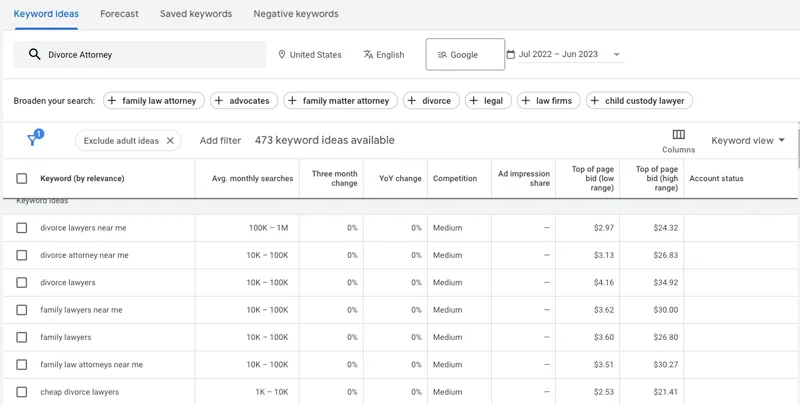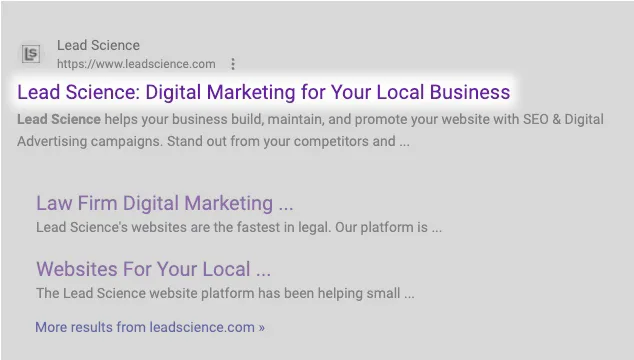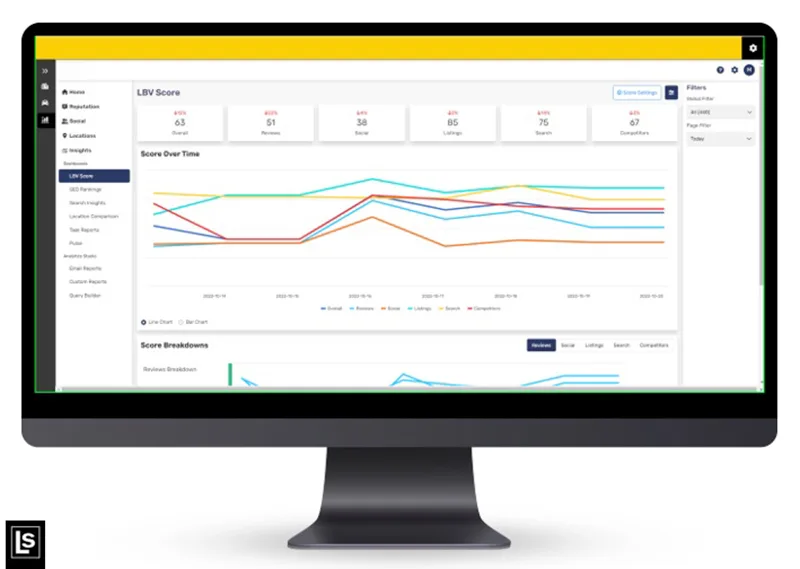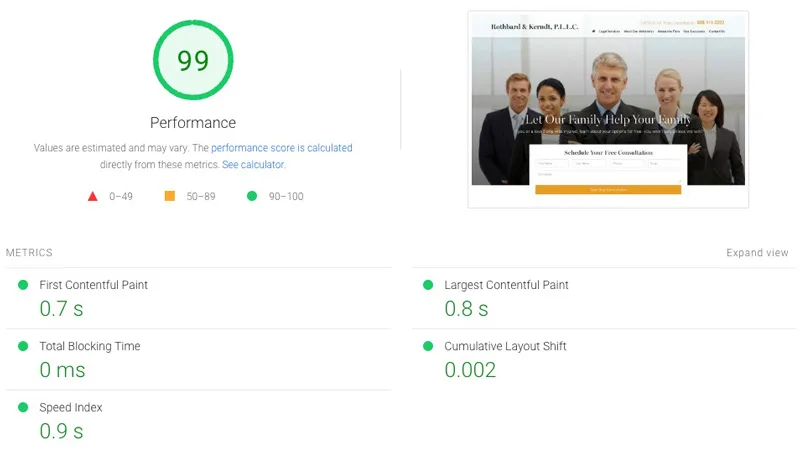Need more search traffic? We’ve got you covered. Drive more organic website traffic to your law firm with these 10 expert SEO tips.
Signing clients to your firm begins with attracting organic search traffic to your website. These are potential clients looking to solve a legal problem, and search for, say “personal injury attorney near me.” When they hit Enter on that search, you want your site as close to the top of the results page as you can make it.
The higher the results, the more organic traffic, and ultimately the more leads you generate and clients you sign. These ten tips will help increase your site’s organic traffic.
1. Use Keywords Effectively
Keywords are the first step in attracting organic traffic. Using them effectively is the cornerstone of your SEO strategy. Among law firms, the obvious keywords suffer from stiff competition. Winning these will take a lot of time and effort that is better spent nurturing your long-tail keywords. These will bear fruit for you much more swiftly.
Your primary keyword is going to be related to your business. “Personal injury law firm” is a good example, though, again this is going to be competitive, and the top spots are inevitably going to be the big guys. Secondary keywords, which are more granular and go into more detail, is where you can start making a dent. Lastly, your long-tail keywords go into specifics which not only are easier to rank for, but also allow you to target your client base most effectively.
The Google Keyword Planner is a great place to start your keyword research. You can also type a partial search into Google and see what the autocomplete tries to finish the query as. Remember, keywords are all about search intent; what a person would type into a search bar that leads them to finding your website.

Tools like the Google Keyword Planner are useful for researching keywords for your website, pages, and articles.
2. Create High-Quality Content
People prefer good writing over bad. Sounds simple, right?
When creating content for your site, either hire a dedicated writer or learn to write yourself. If you’re thinking that you’re a law firm and not a content creator, I have some news. You’re both. A library of quality, informative content is a powerful driver of traffic.
Fortunately for you, as a lawyer, you have the answers to lots of questions that your potential clients will want the answers to. Dedicating your content, in the form of blogs, a podcast, or video series, is sure to help generate organic traffic. As your content improves, you attract more organic visitors, which in turn makes the search algorithms favor your site.
Here are a few guidelines to help your law firm start on your content creation journey:
- Know your target audience: Understand the demographics and needs of your audience to tailor your content accordingly. Consider the specific legal issues they may face and address them in a clear and concise manner.
- Provide value: Offer practical information, insights, and tips that can help your audience navigate legal complexities. Focus on solving their problems and addressing their concerns rather than solely promoting your services.
- Be authoritative: Establish your expertise by sharing accurate and up-to-date legal knowledge. Cite relevant laws, regulations, and court cases to back up your claims and ensure your content is credible.
- Use plain language: Avoid legal jargon and complex terminology that may confuse your audience. Communicate in plain, accessible language that is easy to understand, making complex legal concepts more relatable.
- Create engaging headlines: Craft compelling headlines that grab attention and convey the main benefit or key message of your content. Use concise and impactful language to entice readers to click and explore further.
Demonstrating your knowledge of the law is an effective way to build your reputation, helping you with people and search engines. Create content with long term value, pieces that generate traffic months or even years after publishing by answering commonly asked legal questions.
3. Optimize Your Page Titles
Page titles are a meta-tag that helps search engines understand the information on a page. A good title tag is a concise description of the page and should be distinct from every other title tag on your site. The best tags keep it brief, between 30-70 characters, and have the relevant keyword(s) as part of them. They should outline what makes your page unique and accurately describe what’s on it.

Page titles provide search engines and users with a high-level overview of your webpage.
4. Write Meta Descriptions
Meta descriptions are similar to page titles; HTML elements that summarize the content of a web page. These descriptions generally show up under page titles in search results, but not always. Search engines will occasionally pull a paragraph out of your page content in place of the meta description.
Use target keywords in your meta descriptions. When words from a search query match with words in the meta description, they will appear in bold on results pages, making them catch the eye of browsers. It’s a secondary boost to SEO, but no advantage should be left on the table.
A good meta description should be no longer than 160 characters, be unique among your pages, and describe exactly what visitors will find there. Include those keywords and watch your meta descriptions drive traffic.

Meta descriptions are a summary of your web page that search engines use for search listings.
5. Improve Your URL Structure
URLs, those strings of letters up in the browser’s navigation bar, matter. The URLs for your internal website pages and articles should contain 1-2 keywords or a keyphrase while describing the content of the page. This text is a powerful signal for search engines and can dramatically improve the search performance for the keywords in the URL.
Just don’t overdo it by spamming keywords in your URLs, as this will have a negative impact on your rankings. Shorter URLs perform better in organic searches, so try to keep them to 60 characters max. This also makes your links easier to remember, so keeping your URLs readable helps with your long term marketing efforts.
6. Harness the Power of Featured Snippets
Featured snippets are portions of longer pieces of content that give readers a taste of what they will find within. They standout from standard links on Google results pages and gain more traffic.
These sections of search results pages differ from standard search results. They show information describing the page before the page link; a reverse of the standard search result format. Featured snippets are found throughout search results pages, in the “People Also Ask” section, and within Knowledge Graph sections.
When your piece answers questions the readers have in an authoritative and trusted way, you increase your chances of having a featured snippet.

Google Snippets are a highly sought after section of Google results pages and are awarded to pages that provide useful, authoritative information related to search queries.
7. Link Building
Backlinks are links from other sites to yours. Acquiring a library of backlinks is an important step in digital marketing known as link building. Each one increases your SEO value and improves your site’s authority, though this takes time.
As you can imagine, building backlinks is somewhat out of your hand, but there are methods you can use. The first, and most basic, is to write quality content and promote it well on your social media feeds. Others reposting your links can result in backlinks and will certainly give you more reach. You can also guest write on other sites, cross-promoting your work with another.
Legal directories and local business directories are a prime source of backlinks, as many will allow you to link directly to your website. Tools such as our own Listings Manager can greatly assist with this process, both by automatically creating the listings and maintaining the accuracy of those listings.
Schedule your Lead Science discovery call to learn more about how Listings Manager can manage your business listings and boost your search rankings.

Listings Manager, available exclusively from Lead Science, gives you the power to automatically sync your business listings across the web. With Listings Manager, you gain access to business listing syndication, reputation management, advanced analytics, and much more.
8. Leverage Internal and External Links
You should use both internal and external links on your site, as both will improve your SEO, user experience, and so on. As long as these links lead to other useful pages, both search engines and users will find them to be overall improvements.
Internal links direct users to other pages on your site. They keep people on your page for longer, while at the same time increasing your authority. As you build your blog, for example, don’t be afraid to link to other posts in the text when appropriate to expand on a point or offer additional context. The most important internal link goes to your lead generation form, and it should never be far from any user.
External links go to sites other than yours. You can use these as references for blog posts or examples to illustrate one of your larger points. They can also serve to let other sites with related interests know about your firm and can result in backlinks of your own.
9. Speed Kills
Three seconds. That’s how long your page has to load before most of your traffic leaves. According to Google, after three seconds you’ll lose 53% of your website visitors.
Because load time greatly affects your overall user experience, it greatly impacts your SEO. If your page loads slowly, no one will find it and those who do will likely leave. Run all your pages through Google PageSpeed Insights to check your page speed. Anything loading over three seconds needs a major overhaul.
There are a variety of factors that affect your page load speed, including:
- File size: The size of files, including HTML, CSS, JavaScript, images, videos, and other media, can significantly impact page load speed. Larger file sizes take longer to download and render in the browser.
- Image optimization: Unoptimized images, including large file sizes, high resolutions, and lack of compression, can significantly slow down page load speed. Optimizing images by resizing, compressing, and using appropriate formats can help improve performance.
- Third-party scripts and plugins: Integrating third-party scripts, such as analytics tracking codes, social media widgets, or advertising scripts, can introduce additional HTTP requests and potential delays. Evaluate and limit the use of third-party scripts to minimize their impact on load speed.
- Page structure and hierarchy: The structure and hierarchy of your web pages can affect load speed. Properly organizing and structuring your HTML code, using efficient CSS selectors, and minimizing unnecessary DOM elements can improve load times.
- Caching: Browser caching allows certain resources to be stored locally on the user’s device, reducing the need to download them again for subsequent visits. Properly implemented caching mechanisms can significantly improve page load speed for returning visitors.
Due to the technical nature of the issues that surround page speed, you’ll likely need to speak with your provider or web developer about addressing any issues that arise with your website. Partnering with a team like ours at Lead Science, who are experts on all things related to page speed, is a surefire way to guarantee your site loads quickly for your potential clients.

Tools like Google PageSpeed Insights will tell you how quickly your web page loads and identify problems that need to be addressed.
10. Conduct SEO Audits
Just because something is finished doesn’t mean it’s done. Audit your site regularly to ensure there are no SEO issues preventing your site from reaching your intended audience.
SEO audits involve analyzing various aspects of your website to identify issues, areas for improvement, and opportunities to enhance your visibility in search results pages. These tests evaluate a variety of factors that can affect search performance:
- On-page SEO: This includes examining your website’s title tags, meta descriptions, heading tags, keyword usage, content quality, internal linking structure, URL structure, and overall keyword optimization.
- Technical SEO: The technical aspects of your website are evaluated, including site speed, mobile responsiveness, crawlability, indexability, XML sitemaps, robots.txt files, canonicalization, server errors, and URL redirects.
- Site architecture: Your website’s overall structure and navigation are tested to ensure they are user-friendly and search engine-friendly. This involves analyzing the website’s hierarchy, URL structure, internal linking, and overall user experience (UX).
- Backlink profile: The quality and quantity of backlinks pointing to your website are analyzed to determine their impact on search rankings. This includes assessing the diversity, relevance, authority, and trustworthiness of the backlinks.
- Keyword analysis: The keywords your website is targeting or should be targeting are evaluated. This involves researching relevant keywords, assessing keyword competitiveness, identifying keyword gaps, and optimizing content to target the most effective keywords for improved search visibility.
SEO audits are a valuable tool to ensure your site is always operating at peak performance. Without them you run the risk of overlooking critical issues that can affect your search rankings.
Grow Your Website Traffic With Lead Science
Organic search traffic can be the difference between a successful law firm and one going begging. These ten tips will give you a solid foundation for growing your search traffic.
At Lead Science, our search-optimized website platform and elite team of SEO experts can help rocket your law firm’s website to the top of search results. Our comprehensive SEO packages include:
- Full SEO audits: Our team will analyze your website and quickly identify any issues affecting your search performance.
- Keyword research and optimization: We research the optimal keywords for your website and implement them in custom website content and blog articles created just for you.
- Link building: Lead Science SEO experts strategically develop and implement internal and external link building programs to maximize the search signals and usability of your website.
- Social and reputation management: We work closely with your business to ensure that your social presence and online reputation is as sterling as possible.
- Advanced analytics: Lead Science Beacon Website Reporting (Powered by Google Analytics) provides clear, concise reporting on the performance of your website on a 24×7 basis.
- And many more unparalleled SEO features and services to grow your search traffic.
Schedule your Lead Science discovery call today. We’d love to show you how our website platform and SEO services can boost your search rankings and generate more business for your law firm.







